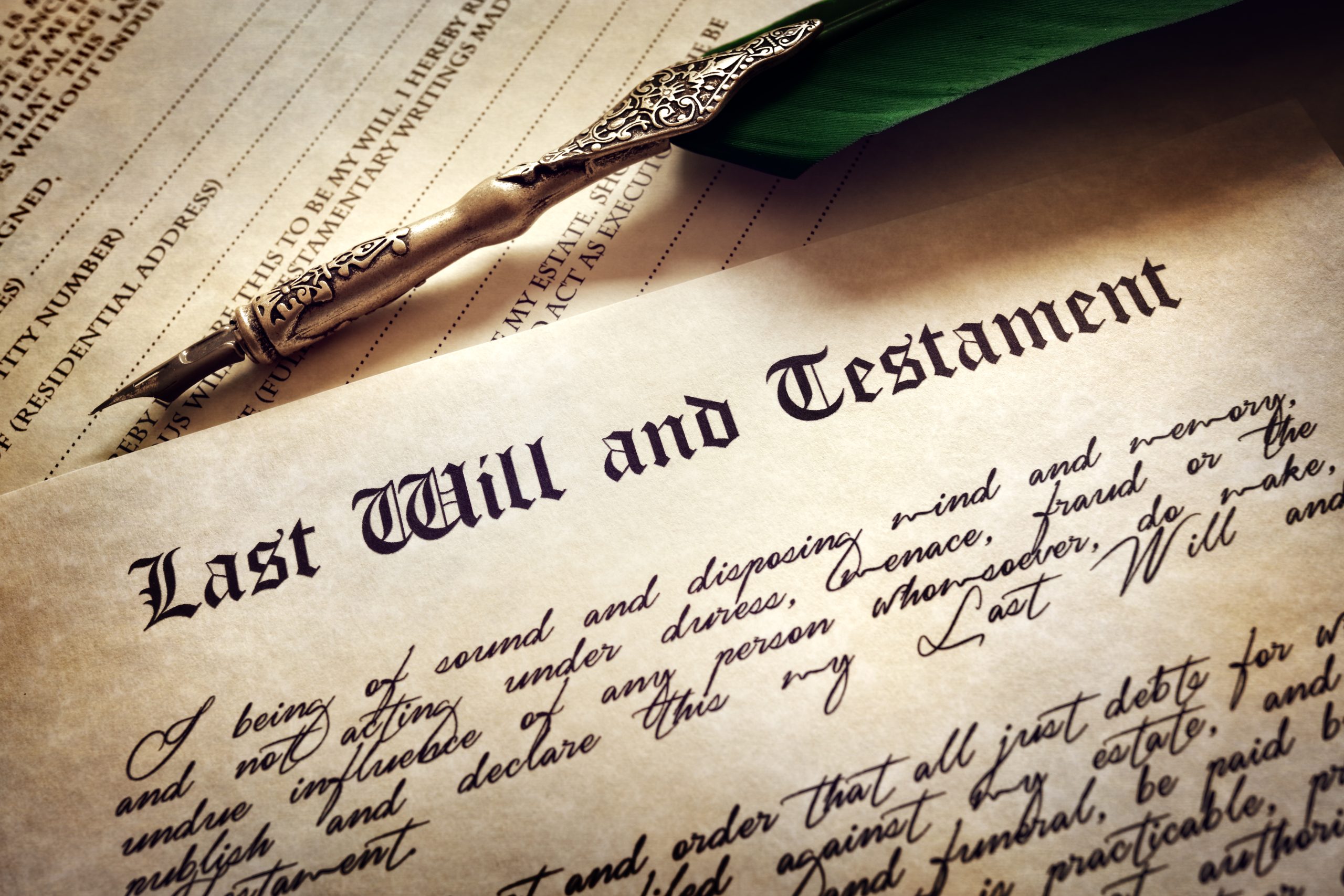Navigating the legal aspects of creating a will can be complex and may require professional guidance. One common question is what kind of a lawyer does wills. The answer lies in understanding the different types of lawyers who handle wills and their specific areas of expertise.
Understanding Wills
A will, also called a last will and testament, is an official legal document outlining the distribution of a person's property and assets after death. One of the primary roles of a will attorney is to ensure that a client's will is properly drafted, valid, and enforceable under the law. A will attorney can assist with the creation, updating, or management of a will, as well as address any issues that may arise during the probate procedure.
The four prominent types of wills are simple wills, testamentary trusts, joint wills, and living wills. Each type performs a specific purpose, catering to different circumstances. Understanding the different types of wills is essential when determining the appropriate option for your personal situation.
- Simple wills are the most common type of will. These wills outline the basic distribution of assets and designate beneficiaries. Simple wills are best suited for individuals with uncomplicated financial situations and estates.
- Testamentary trusts are set up within a will and only become effective after the death of the individual who created the will. Testamentary trusts are often used to provide ongoing support for beneficiaries, such as spouses or minor children.
- Joint wills are created by two people, typically spouses, who agree to entitle their property and assets to each other. Upon the death of one spouse, the surviving spouse becomes the sole beneficiary of the estate.
- Living wills outline an individual's healthcare preferences in case they are unable to communicate their wishes due to illness or incapacity. Living wills are not concerned with the distribution of assets and property.
When creating a will, it is important to follow specific formalities, such as signing the will in the presence of witnesses. Failure to adhere to these procedures may result in an invalid will. In certain situations, it may be beneficial to enlist the guidance of a skilled will attorney, ensuring a properly executed will that fulfills your intentions.
Types of Lawyers for Wills
Estate planning is a complex and important process for individuals looking to protect their assets and provide for their loved ones. The type of lawyer that deals with wills is known as an estate planning attorney. These attorneys handle not only the drafting of wills but also trust documents, healthcare and financial powers of attorney, living wills, and HIPAA releases. They strive to provide protection for their clients' loved ones and assets, helping them avoid costly probate.
Estate planning attorneys often collaborate with probate lawyers. A probate lawyer assists the family in carrying out the deceased's wishes as outlined in the will. Probate lawyers can ease the process of distributing assets and property in line with the will and the law, ensuring that the deceased's intentions are followed after death.
In conclusion, the primary types of lawyers for wills are estate planning attorneys and probate lawyers. Both play essential roles in securing an individual's assets and ensuring the smooth distribution of property according to their wishes. Engaging an experienced lawyer in these fields can provide peace of mind and protect your estate for future generations.

Estate Planning Attorneys
Hiring an estate planning attorney can provide invaluable guidance and peace of mind, ensuring your wishes are properly documented, legally enforced, and tax-efficient.
Role and Responsibilities
Estate planning attorneys, also known as estate law attorneys or probate attorneys, are experienced and licensed legal professionals who specialize in planning for the management and distribution of a person's estate after their death. They have a thorough understanding of state and federal laws governing how your property and assets will be inventoried, valued, dispersed, and taxed after your passing.
Some of the key responsibilities of an estate planning attorney include:
-
- Drafting wills and trusts
- Advising on asset protection
- Ensuring the most tax-efficient distribution of assets
- Navigating probate and estate administration processes
- Coordinating beneficiary designations
- Providing guidance on powers of attorney and healthcare directives
Estate planning attorneys should be knowledgeable in several areas of law, such as real estate law, estate and inheritance taxes, probate, and life insurance. Consulting a lawyer with expertise in these fields can help ensure a valid will that adheres to state-specific requirements.
When to Consider
It is recommended to confer with an estate planning attorney when:
-
- Creating a will or trust: An attorney can help ensure your wishes are accurately documented and legally binding, minimizing the chances of disputes or misinterpretations after your passing.
- Updating an existing estate plan: Life changes, such as marriage, divorce, the birth of a child, or the acquisition of significant assets, may justify a review of your estate plan to ensure it still meets your needs and intentions.
- Navigating complex estate planning decisions: An attorney can assist with issues such as blended families, business succession planning, or special needs considerations that may require a more tailored and sophisticated approach.
- Dealing with tax implications: Estate planning attorneys can help you understand and minimize the potential tax consequences associated with the transfer of your assets.
- Administering an estate: If you have been appointed as an executor or trustee, an estate planning attorney can provide guidance and assistance in carrying out your duties and navigating the probate process.
Probate Lawyers
A probate lawyer's expertise becomes invaluable in ensuring a smooth and legally compliant settlement of the estate. Trusting in their knowledge and skills can help to avoid potential disputes and complications that may arise during the probate process, saving time, money, and stress for all the involved parties.
Role and Responsibilities
Probate lawyers are state-licensed attorneys who specialize in the legal process of managing the administration of a deceased person's estate. They are experts in matters related to wills, trusts, and estates, and their primary responsibility is to assist the executor of a will or the beneficiaries of an estate in settling the estate according to the law.
Some everyday tasks a probate lawyer can handle include:
-
- Reviewing and validating the will to ensure it is in accordance with the laws.
- Guiding the executor in administering the estate and distributing assets.
- Identifying and locating beneficiaries.
- Helping with filing and paying estate taxes.
- Advising on the probate process and navigating any disputes or challenges from beneficiaries or creditors.
When to Consider
Hiring a probate lawyer is essential in situations where:
-
- The deceased has left a considerable estate, including property, bank accounts, and investments.
- The will is complex, or there are concerns about its validity.
- Legal disputes or challenges arise from beneficiaries or creditors.
- The deceased died without a will (intestate).
- The executor requires guidance on the legal rights and obligations during the probate process.

Tax Lawyers and Wills
The involvement of a tax lawyer in wills is primarily focused on ensuring that the estate plan effectively addresses any tax concerns while minimizing the potential tax liabilities for the testator and their beneficiaries.
Role
Tax lawyers are legal professionals who specialize in tax laws and regulations. They primarily deal with tax-related issues, such as tax disputes, fraud, and planning. Tax lawyers have a deep understanding of federal and state tax laws, which can be essential when dealing with complex estate planning situations.
In the context of wills, a tax lawyer's role is often focused on minimizing the tax implications of transferring assets to one's heirs. This focus can include determining the most tax-efficient methods to distribute property, as well as addressing any potential tax liabilities that may arise during the probate process or the administration of a trust.
Involvement in Wills
While tax lawyers are not primarily responsible for drafting wills or handling the probate process, they may be consulted during estate planning to provide expert advice on tax-related matters. Their involvement can be crucial to ensure the proper management of tax obligations and to prevent any legal issues arising due to incorrect handling of tax-related matters in wills.
In some cases, a tax lawyer will work together with an estate planning attorney to help their clients effectively navigate the tax complexities related to wills. This collaboration allows for the creation of a comprehensive estate plan that considers both the legal requirements for the wills and trusts, as well as the tax implications.
When it comes to tax-related matters in estate planning, tax lawyers can help with the following:
-
- Advising on tax-efficient strategies to reduce estate tax liability
- Identifying potential tax issues that may arise during the probate process
- Assisting in the tax return preparation for the estate and beneficiaries
- Advising on the tax consequences of specific bequests in a will or trust
How to Choose the Right Lawyer
Choosing the right lawyer for handling wills requires careful consideration of their qualities, experience, and reputation. Focus on their communication skills, expertise in estate planning, and the feedback they've received from previous clients to make an informed decision.
Qualities
When selecting a lawyer specializing in wills, it is crucial to consider their qualities. Look for professionals who can clearly explain the process and respond to your concerns effectively. Good communication skills, empathy, and respectfulness are keys to building a successful attorney-client relationship. Pay attention to how well a lawyer listens to your needs and expectations. A lawyer who is easy to reach and consistently available can make the process smoother and more efficient.
Experience
The right lawyer should have sufficient experience in dealing with wills. Choosing an attorney who focuses on estate planning and administration is advisable, as they have the knowledge and expertise required to handle complex cases. Make sure to ask potential lawyers about their experience in drafting wills, their familiarity with probate laws, and any relevant certifications or memberships they hold. Also, inquire about their experience working with trusts and estates to gauge their ability to address unique aspects of your case.
Reputation
Lastly, it's essential to assess a lawyer's reputation before hiring them. Conducting a thorough background check on prospective attorneys and gathering reviews from past clients. This research may entail checking online portfolios, professional websites, and legal directories for information on their achievements, success rates, and client testimonials. Additionally, seeking recommendations from friends, family, or trusted professionals can help narrow down your choices and potentially lead you to a good probate attorney.
What Kind of a Lawyer Does Wills Wrap-Up
Three primary types of lawyers handle wills. The first is the estate planning attorney, who specializes in wills and trusts, ensuring that all legal aspects of estate planning are addressed before your death. Alternatively, a probate lawyer helps in the probate process, assisting the executor or beneficiaries in settling an estate after death. And lastly, tax lawyers can contribute to pre- and post-death planning to help clients minimize tax liabilities.
Frequently Asked Questions
What are the key responsibilities of an estate planning attorney?
An estate planning attorney advises clients on the best strategies for managing their assets and estate upon their passing. This includes drafting legal documents such as wills and trusts, as well as, providing guidance on tax ramifications and other legal matters related to estate planning.
What services can I expect from a wills and trusts attorney?
A wills and trusts attorney can provide various services, such as creating and updating wills or establishing trusts, ensuring the correct legal language is used. They may also help with the probate process, counsel on disputes and challenges to the will, and advise on estate tax issues.
When should I consider hiring an estate lawyer?
It is essential to consider hiring an estate lawyer when you start planning for your future and want to ensure your assets and beneficiaries are appropriately managed in the event of your death or incapacitation. Other reasons to consult an estate lawyer include changes in family dynamics, such as marriage or divorce, a significant asset increase, or updates to your taxable estate.
What is the difference between estate and probate law?
Estate law focuses on the planning and managing of assets during a person's lifetime and how they will be distributed upon death. On the other hand, probate law deals with the distribution of assets and estate administration after someone passes away, ensuring the decedent's wishes are followed as stated in their will. While both areas overlap, estate law generally deals more with the preventative measures taken during an individual's life, whereas probate law addresses issues after death.
How do I find the best estate lawyer near me?
To find the best estate lawyer in your area, you can look for recommendations from your friends and family or search online for local attorneys with good reviews. Additionally, contacting your state's Bar Association can provide you with a list of qualified estate planning lawyers in your region. It's essential to vet potential attorneys by scheduling consultations and discussing your specific needs to determine if they are a good fit.
What are the costs involved in creating a will or estate plan?
The costs associated with creating a will or estate plan can differ, depending on the complexity of the plan and the attorney fees. Based on the data from Lawyers.com, total amounts paid to lawyers for probate and estate administration can range from less than $2,500 to more than $10,000. To better understand the costs you may incur, confer with a local estate planning attorney to discuss your specific needs and requirements.




